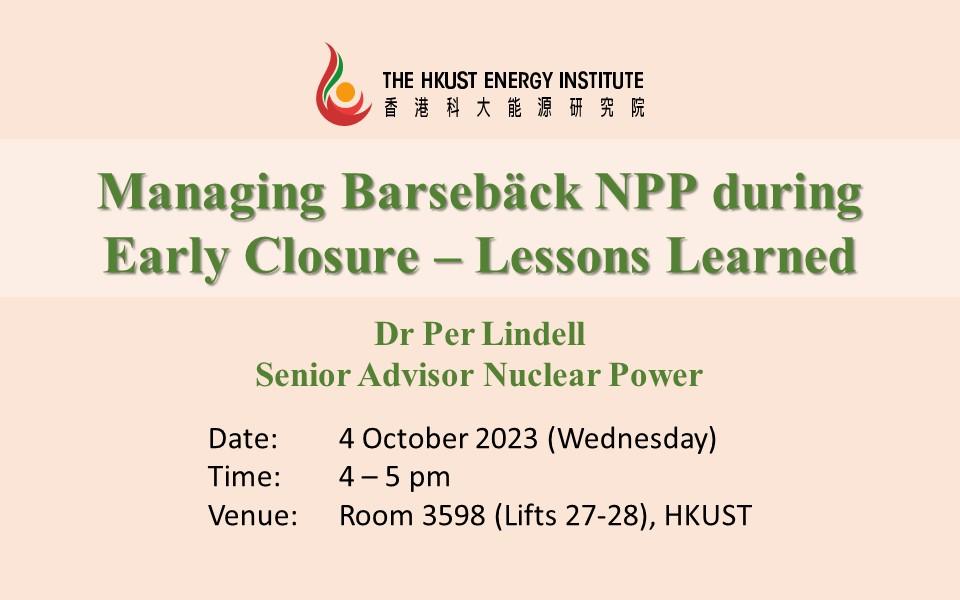Managing Barsebäck NPP during Early Closure – Lessons Learned
Supporting the below United Nations Sustainable Development Goals:支持以下聯合國可持續發展目標:支持以下联合国可持续发展目标:
Dr. Per Lindell was the CEO of a Nuclear Power Plant in Southern Sweden, that was threatened to close due to political reasons. The name of the plant is Barsebäck, with two identical units commissioned in 1975 and 1977. That plant became the symbol of opposition to nuclear power and over the years large demonstrations were held outside the plant. The Swedish parliament and government had numerous occasions discussed the premature closure of the plant, without success – until 1999 – when he was in charge as CEO.
The plant held a formal license to operate, from legal and safety perspectives and the nuclear regulator saw no safety reasons to support a closure – on the contrary – the regulator found the plant in good shape and well taken care of. If the plant was to be closed due to political reasons only – the Swedish state had to compensate the power utility for the losses incurred.
In July 1998, the government decided to close down Barsebäck 1. That decision was appealed by the utility, to the Supreme Court of Sweden. The court later that year announced “inhibition” of the government decision waiting for the court’s final judgment.
The presentation starts from 1 June 1999 – only 16 days before the Supreme Court’s decision was to be public – and runs up to the closure on November 30. The presentation focuses on leadership issues and how to keep an engaged staff at a nuclear power plant motivated to perform a qualified work with high nuclear safety culture.
A number of tough decisions had to be made – by him as CEO – to maintain high nuclear safety and morale at the plant. Before the verdict to close, focusing on keeping the plant up-to-date and “business as usual” as part of that strategy. There were several problems to handle with staff, around uncertainties, rumours, support and confidence etc. It was also important to explore and communicate future possibilities to maintain staff trust. Leadership, visibility and communication were essential for the CEO and the Lead Team.
The reduction of staff was handled carefully, with different options for staff, like early retirement schemes, additional training into new roles etc.
Critical success factors were:
- Always give a well-timed, open and reliable information – never hide!
- Be supportive to your staff – show solutions and express ideas.
- Create belief in future prospects and job security.
- Reduce uncertainties through communication and dialogue.
- Conduct continuous analysis and be sensible for mood changes.
- Trustful co-operation with the labour unions – we got good support.
- A strong leadership necessary – be visible and available.
For a period of more than 40 years, Dr. Per Lindell, Senior Advisor Nuclear Power, has worked in several management positions inside power companies in Sweden in quite different areas such as nuclear power, fossil co-generation of heat and electricity, group strategy/business development and, finally, distribution of electricity and natural gas.
Dr. Lindell’s career began with a Master of Science exam 1975 in Engineering Physics at the University of Lund in Sweden. He was employed at Barsebäck nuclear power plant (NPP) as a nuclear engineer working with core physics and governance of reactor operation. He was responsible for the commissioning of the reactor at unit 2 in 1977, with the execution of all tests of criticality and reactor dynamics.
He was promoted to Manager of Operation for both units of Barsebäck NPP (1982-1985). He always had a special interest in nuclear safety and nuclear safety culture and have dealt with several complicated issues in that field. During his ten years at Barsebäck NPP, he acquired his nuclear acumen and deep respect for nuclear safety.
In 1999, Dr. Lindell returned to Barsebäck as the Station Director for the NPP, dealing with the closure of Barsebäck unit 1. He was later Managing Director (2005-2010) of E.ON Kärnkraft Sverige AB (EKS). As the Managing Director or EKS, he has been member of all Swedish NPP supervisory boards, chairman of Oskarshamn (OKG), vice chairman of Ringhals and SKB and member of the Forsmark board.
He left his formal management positions in 2010 and now act as a senior consultant and advisor in nuclear power and nuclear safety with a number of earlier and current assignments
- Chairman of an advisory group to the Director General of IAEA
- Chairman of E.ON Nuclear Safety Council (Germany/Sweden)
- Chairman of Fortum (Finland) Nuclear Safety Council
- Chairman of Uniper (Sweden) Nuclear Safety Council
- Member of EDF Energy (UK) Nuclear Safety Review Board
- Member of Nuclear Decommissioning Authority Board (UK) HSSE Committee
Dr. Lindell is also giving lectures in a Master’s program in nuclear energy engineering at the KTH Royal Institute of Technology in Stockholm. His lectures cover industry safety self-assessment with independent oversight and experiences from being an executive manager in the nuclear field.
Dr. Lindell was awarded the Swedish Nuclear Society Honorary Prize 2022 “for unique enduring and great contributions to the nuclear industry, in Sweden and internationally, as a recognised senior expert with several international top assignments. He has contributed with profound interest to constantly improve the safety performance”. The prize is rewarded to those who have meritoriously promoted technological and scientific development in the peaceful field of nuclear technology or stimulated the exchange of experience and knowledge in the nuclear field.
